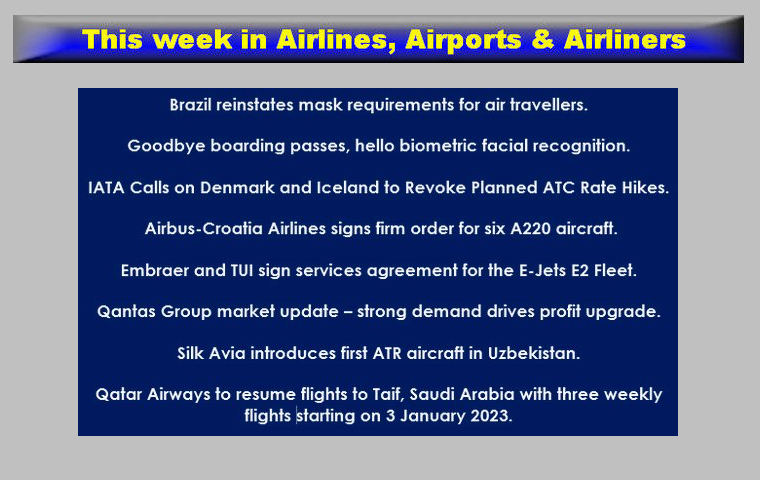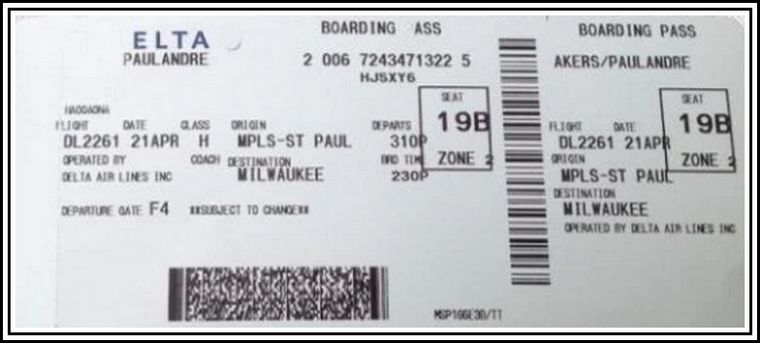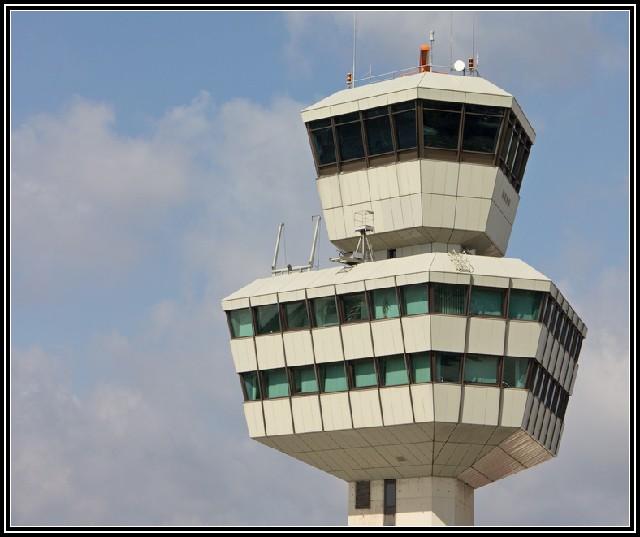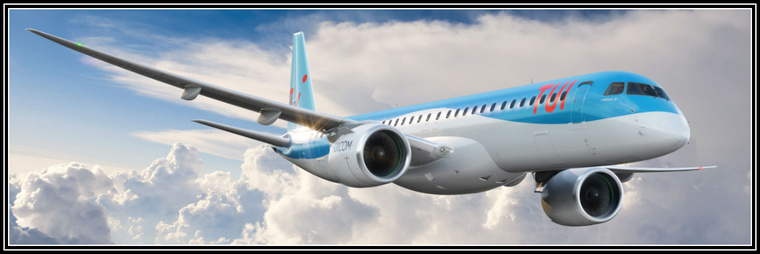Airlines, Airports and Airliners 28 Nov to 4 Dec 2022
Compiled by Willie Bodenstein
Google Banner Ad

BRAZIL REINSTATES MASK REQUIREMENTS FOR AIR TRAVELLERS

The Government of Brazil requires all air travellers to wear approved masks or face coverings beginning Friday, approved face masks are mandatory in Brazil while boarding and disembarking flights. Face masks will also be required within all Brazilian airports. This guidance applies to all customers 3 years of age and older, unless granted a medical exemption by the Government of Brazil.
Face masks must be secured to the face with ties or ear loops and adjusted to fit snugly over the nose, mouth and chin to minimise entry or exit of air or respiratory droplets. Customers should note that acrylic/plastic face masks or shields, masks with exhalation valves, cloth bandanas, single-layer fabric masks and other masks intended for non-professional use are prohibited for air travel by the Brazilian government. Surgical or medical-style masks are the preferred choice to meet these masks requirements.
GOODBYE BOARDING PASSES, HELLO BIOMETRIC FACIAL RECOGNITION

Recently Air New Zealand customers were some of the first to experience biometric verification at the boarding gate after a successful trial at Los Angeles Airport. It's all part of Air New Zealand's plan to take the friction out of travel and to make the journey through the airport that much smoother. No sighting passports and no scanning boarding passes.
Upon entering the US, customers are provided with the opportunity to register with Customs and Border Protection (CBP) using their biometric information.
Using the automated airport kiosks, this same data is then used to verify their identity at the time of boarding. Biometric information is secured by CBP and not directly accessible to Air New Zealand or any other airline using this service.
Air New Zealand Chief Digital Officer Nikhil Ravishankar says this technology will speed up the boarding process, creating a seamless experience for customers and airport staff.
"We've heard from customers that they want their airport experience to be hassle-free and technology is a key enabler of that. According to IATA, more than 75 percent of customers see huge value in biometric verification and want to use it instead of passports and boarding passes.
"The feedback from the more than 1000 customers who have used this technology to board our flights has been really positive."
The next cab off the rank is San Francisco, followed by the airline's other US ports.
"Contactless technology changes are coming thick and fast and we're continuing to learn and adapt to new innovations that will make travel easier. In the new travel era, we need simplicity not complexity."
Earlier this month, the airline launched its improved Air NZ App, which has had close to 2.3 million downloads.
"Using biometrics at the boarding gate is only the beginning and we're in talks with industry players, globally and here in New Zealand, about how we can use biometric technology throughout the whole airport process."
This is another step towards our ambition to become the world's leading digital airline and is the result of months of hard mahi, planning and collaboration."
Google Banner Ad
IATA CALLS ON DENMARK AND ICELAND TO REVOKE PLANNED ATC RATE HIKES

The International Air Transport Association (IATA) called on both the Danish and Icelandic Air Navigation Service Providers (ANSP) to revoke the planned increases in air traffic charges set to come into effect on 1 January 2023.
On average, the fees paid by airlines for crossing the airspace managed by these two ANSPs on North Atlantic routings will rise by up to 30%. The increase was announced unilaterally by the two ANSPs without any user consultation, user input or justification.
In response, IATA has written to the Danish Transport, Construction and Housing Authority and Isavia ANS, calling for the plans to be scrapped.
"This is a cash grab by two monopoly suppliers with no justification. It must be stopped. Why should airlines pay a higher price for a service by a monopoly supplier that has not changed and with nothing to justify the higher cost? Rather than ramping up charges, the providers should be looking to achieving efficiencies that will keep costs under control. If efficiencies cannot be found, then it is time for these suppliers to sit in consultation with their customers to review proposals. The unilateral approach that has been taken is totally unacceptable," said Peter Cerda, IATA's Regional Vice President, Americas.
A transparent consultation process, conducted in accordance with International Civil Aviation Organisation (ICAO) guidelines, is a well-established international practice. As part of this exercise, detailed information on the proposed increases, including differences in cost structure, traffic data of the past five years and the 2023 traffic forecast, needs to be made available to airlines.
AIRBUS-CROATIA AIRLINES SIGNS FIRM ORDER FOR SIX A220 AIRCRAFT

Croatia Airlines, Croatia's national flag carrier based in Zagreb, has signed a firm order for six A220-300 aircraft. Croatia Airlines plans to lease an additional nine A220s, taking its total commitment for the type to 15.
The A220s will replace previous generation aircraft in the company's fleet, reducing operating costs as well as improving environmental efficiency and competitiveness while offering passengers unrivalled comfort throughout its fleet.
"Today's signing of a contract for the purchase of state-of-the-art Airbus aircraft is a very special moment for all of us at Croatia Airlines. It marks the beginning of a new period of aviation, a new period in the life of Croatia Airlines, a new period for our passengers and a new period for Croatia's tourism and economy as a whole," said Jasmin Bajic, CEO and President of the Management Board of Croatia Airlines.
"We are thrilled to add Croatia Airlines as a new A220 customer. The A220 is ideally suited to Croatia's aviation needs, providing operational flexibility and efficiency allowing its airline to pursue its ambition for both regional and international connectivity without compromising on any aspect, be it passenger comfort or trip and seat cost economics," said Christian Scherer, Airbus Chief Commercial Officer and Head of International.
The A220 is a clean sheet design and the only aircraft purpose-built for the 100 to 150-seat market segment bringing together state-of-the-art aerodynamics, advanced materials and Pratt & Whitney's latest generation GTF™ engines. The A220 delivers a 50% reduced noise footprint, up to 25% lower fuel burn per seat and CO2 emissions - compared to previous generation aircraft, as well as around 50% lower NOx emissions than industry standards.
Airbus and Croatia Airlines have had a long-standing partnership starting 25 years ago, when the airline first became an Airbus operator. Today, the Croatian carrier operates an Airbus fleet of seven single-aisle aircraft from the A320 Family (five A319s and two A320s).
With currently more than 230 A220s delivered to 16 airlines operating on four continents, the A220 is the optimal aircraft for regional as well as long-distance routes and will enable Croatia Airlines to further contribute to the development of tourism in the region, while providing flexibility to right-size their operations.
To date, more than 70 million passengers have enjoyed the A220. The fleet is currently flying on over 800 routes and 325 destinations worldwide. As of the end of October 2022, around 30 customers have ordered 780+ A220 aircraft - confirming its breakthrough on the small single-aisle market.
Google Banner Ad
EMBRAER AND TUI SIGN SERVICES AGREEMENT FOR THE E-JETS E2 FLEET

Embraer and the TUI Group announced today that they have signed a contract for the Pool Program to support TUI's fleet of Embraer E195-E2s. The TUI Group will take delivery of three E195-E2 aircraft from AerCap on a long-term lease. The aircraft, from AerCap's existing fleet, will be delivered in a comfortable 136-seat single-class configuration in the first half of 2023.
The contract will provide the airline access to component exchanges and repair services for more than 340 repairable parts, plus interchangeable parts for TUI's Embraer aircraft. Currently, Embraer's Pool Program supports more than 50 airlines worldwide.
"It's a pleasure for Embraer to have TUI on board the Pool Program. Beyond having access to all Embraer's spare parts inventory, TUI will count on the OEM's expertise to support its E2 fleet," said Danielle Vardaro, Vice-President of Worldwide Customer Support and Aftermarket Sales, Commercial Aviation, Embraer Services & Support.
"Signing this new agreement with Embraer for the E195-E2 Pool Program ensures a high component availability and access to a comprehensive support and services package. This will allow us to operate our new E2 jets for our guests according to TUI's high operational standards", said Geert Somers, Engineering & Maintenance Director at TUI Airline.
Embraer's Pool Program is designed to allow airlines to minimise their upfront investment in high-value repairable inventories and resources, while taking advantage of Embraer's technical expertise and vast repair service provider network for components. The results are significant savings on repair and inventory carrying costs, reduction in required warehousing space, and the virtual elimination of the need for resources required for repair management, while ultimately providing guaranteed performance levels.
QANTAS GROUP MARKET UPDATE - STRONG DEMAND DRIVES PROFIT UPGRADE

Continued strength in travel demand has resulted in the Qantas Group upgrading its profit expectations for the first half of FY23. The Group now expects an Underlying Profit before Tax of between $1.35 billion and $1.45 billion. This represents a $150 million increase to the profit range given in early October 2022.
Consumers continue to put a high priority on travel ahead of other spending categories and there are signs that limits on international capacity are driving more domestic leisure demand, benefiting Australian tourism.
Fuel costs remain significantly elevated compared with FY19 and are expected to reach approximately $5 billion [1] for FY23, which would be a record high for the Group despite international capacity at around 30 per cent below pre-COVID levels.
Operational performance has continued to improve, with Qantas ranking as the most on-time domestic airline in October. The $200 million investment in rostering additional staff, continued recruitment and reserve aircraft will help maintain these levels during the latest wave of COVID infections in the community and into the busy Christmas period, as well as limiting the impact of extreme weather (especially wind) in November.
The Group's net debt is now expected to fall to an estimated $2.3 billion and $2.5 billion by 31 December 2022. This is around $900 million better than expected in the most recent update, due largely to the acceleration of revenue inflows as customer's book flights on Qantas, Jetstar and partner airlines into the second half and beyond, as well as deferral of approximately $200 million of capital expenditure to the second half.
Around 60 per cent of the $2 billion in COVID-related travel credits held by the Group have now been redeemed by customers. Total credit usage is consistent at a rate of circa $70 million a month and new initiatives will be announced shortly to encourage full use of remaining credits over the next year.
While capacity is constrained, over a million sale fares were launched in October and further sale activity is planned in the weeks ahead. More than five million reward seats are available for frequent flyers over the next year and more Points Planes will be released soon. The Group is adding capacity as quickly as possible in the second half of the year while maintaining operational reliability.
Of the $400 million share buyback announced in August 2022, 76 per cent is now complete at an average price of $5.66. Low levels of net debt put the Board in a position to consider future shareholder returns in February 2023 consistent with the Group's financial framework and phasing of capital expenditure for fleet renewal.
The Group recently finalised a three-year agreement with Jetstar pilots as part of its improved pay policy and expects to reach in-principle agreements with others in coming weeks. More than 6,500 employees, or 33 per cent of those covered by an enterprise agreement, have now signed up to a post-COVID EBA. The Group remains on-track to share the benefits of the recovery with around 20,000 non-executive employees through a $5,000 boost payment and up to 1,000 Qantas shares (currently worth approximately $6,000), subject to key conditions being met.
Google Banner Ad
SILK AVIA INTRODUCES FIRST ATR AIRCRAFT IN UZBEKISTAN

Market-leading aircraft manufacturer ATR and Silk Avia, Uzbekistan's new regional airline, have signed Heads of Agreement (HOA) for the acquisition of five new ATR 72-600, three directly from ATR and two from a lessor. In addition to this agreement, the airline will soon start its operations with three used ATR 72-600.
Silk Avia's owner, Uzbekistan Airports, has invested heavily in establishing a wide network of upgraded and new airports to better serve the domestic and regional market. The primary purpose of Silk Avia is to stimulate domestic tourism and business development. The airline will also increase regional connectivity to the capital of Tashkent and provide direct access between the Uzbek cities. These aircraft will open up new point to point opportunities, serving around 40 routes in the country. They will connect 11 domestic airports and 7 additional airports in the future, supporting the growth of the country and its thriving tourism industry.
The operational versatility and affordability of the ATR 72-600 are proven worldwide, burning 45% less fuel and emitting 45% less CO2 than a similar-sized regional jet, positioning ATR as the perfect fit for economical and sustainable expansion. The aircraft will be equipped with the new PW127XT engines, offering a 20% reduction in maintenance costs and a 3% reduction in fuel consumption compared to the existing engine. Silk Avia's aircraft will be the first new ATRs to operate in the whole Central Asia.
Silk Avia and ATR have also announced the signature of a Global Maintenance Agreement (GMA). Through this five-year pay-by-the-hour contract, Silk Avia will take full advantage of manufacturer expertise to support its ATR aircraft, thereby reducing maintenance costs while boosting operations. The contract includes the repair, overhaul and Line Replaceable Unit Pool Exchange Service, an on-site stock of spare parts, a spare part agreement, along with propeller availability and maintenance services.
Rano Dzhuraeva, Chair of Uzbekistan Airports, says: We are excited to be soon launching our operations with an all-ATR fleet. As a new low-cost airline, we undertook an extensive review of which aircraft would provide the best solution. Our selection of the ATR 72-600 is the perfect choice for us as they will ensure we can offer our passengers the most modern, comfortable and reliable experience in the most affordable and sustainable way."
ATR Chief Executive Officer, Nathalie Tarnaud Laude, comments: "There is no better solution to provide essential links than an ATR 72-600, the sustainable benchmark in regional aviation today. In a fast-growing country such as Uzbekistan, Silk Avia will play a key role by offering vital links for local communities and boosting the economy. Studies have shown that an increase of 10% in regional flights can lead to a 5% increase in local GDP and ATR contributes by providing the most responsible and affordable regional aircraft. We warmly welcome Silk Avia as one of our newest customers, opening a new market for ATR in Central Asia."
Google Banner Ad
QATAR AIRWAYS TO RESUME FLIGHTS TO TAIF, SAUDI ARABIA WITH THREE WEEKLY FLIGHTS STARTING ON 3 JANUARY 2023

Qatar Airways is pleased to announce that it will resume services to Taif starting on 3 January 2023 with three weekly flights. This is the airlines' sixth destination in Saudi Arabia.
The resumption of services will enable passengers flying from and to Taif to benefit from the airline's extensive international network to across Asia, Africa, Europe and the Americas via the World's Best Airport, Hamad International Airport.
Qatar Airways flight QR1206, will depart from Hamad International Airport at 07:40, arriving at 10:10 at Taif International Airport. Qatar Airways flight QR1207, will depart from Taif International Airport at 11:10 and arrive at Hamad International Airport at 13:20.
Qatar Airways is currently operating two daily flights from Riyadh, four daily flights from Jeddah, two daily flights from Medina, five daily flights from Dammam and a daily flight from Qassim.
Qatar Airways recently announced that Privilege Club has officially adopted Avios as its reward currency, opening up a world of new opportunities for members travelling across the airline's extensive network. This partnership offers a combination of benefits, including a wide range of greater guaranteed award seats and competitive prices on Qatar Airways flights, in addition to experiencing the World's Best Airline and enjoying the World's Best Airport, Hamad International Airport (HIA).
Hamad International Airport (HIA) ranked "Best Airport in the World" for the second year in a row by SKYTRAX World Airport Awards 2022 is preparing to welcome 58 million passengers annually. A stunning expansion was recently unveiled featuring a 10,000-sqm, lush, tropical indoor garden named "The Orchard." Drenched in natural light and featuring sustainably sourced plants and shrubs, it offers a show-stopping, luxury shopping experience to passengers with many first-of-a-kind retail outlets.
A multiple award-winning airline, Qatar Airways was recently announced as the 'Airline of the Year' at the 2022 World Airline Awards, managed by the International Air Transport rating Organisation, Skytrax. The airline continues to stand alone at the top of the industry having won the main prize for an unprecedented seventh time (2011, 2012, 2015, 2017, 2019, 2021 and 2022), while also being named 'World's Best Business Class', 'World's Best Business Class Lounge Dining' and 'Best Airline in the Middle East'.
Qatar Airways currently flies to more than 150 destinations worldwide, connecting through its Doha hub, Hamad International Airport, voted by Skytrax as the 'World's Best Airport'.
Google Banner Ad

|
                 |























